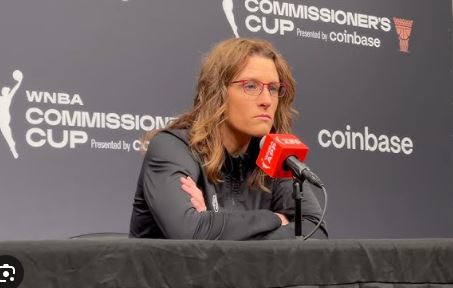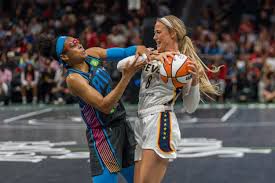
Sophie Cunningham Speaks Out on DeWanna Bonner’s Exit from Indiana Fever and Its Aftermath: A Deep Dive into Team Culture, Expectations, and WNBA Dynamics
When players change teams in professional sports, it often stirs emotions—both among fans and within the locker room. And when the departure is sudden or handled without clear communication, those emotions can turn sour. Such was the case when DeWanna Bonner, a seasoned WNBA star and longtime veteran, left the Indiana Fever and rejoined her former team, the Phoenix Mercury, in July. Now, one of her former teammates, Sophie Cunningham, is making waves by openly sharing her thoughts on Bonner’s exit on her new podcast, Show Me Something.

Cunningham, who is known for her fierce playing style and unapologetic honesty, didn’t mince words when reflecting on how things unfolded. Speaking to her podcast audience, Cunningham expressed a deep sense of surprise and disappointment—not necessarily because Bonner left the Fever, but because of how she left. What particularly stood out to Cunningham was Bonner’s lack of communication with her teammates, many of whom were caught off guard by the move and left feeling somewhat disrespected by the absence of a proper goodbye or even a brief message.
The Context Behind Bonner’s Departure
On July 7, DeWanna Bonner officially signed with the Phoenix Mercury, a team she had spent a decade with earlier in her career. During her previous stint with the franchise, she earned two WNBA championships, built strong relationships, and became a key figure in the team’s history. Her return was not only a homecoming in terms of basketball but also a personal reunion, as she was rejoining her fiancée, Alyssa Thomas, who also plays for the Mercury.
This dual return—to a beloved franchise and to a life partner—was framed by many as a heartwarming move. From a personal standpoint, it made sense. From a professional angle, it was a reminder of how fluid and unpredictable player movement can be in professional leagues. Yet for Cunningham and others in the Indiana locker room, the lack of closure is what left a mark.
Booed in Indiana: Fan Reactions Stir Controversy
When the Phoenix Mercury returned to Indiana on July 30 for a matchup against the Fever, emotions ran high—particularly among the fans in the arena. Bonner, now wearing the colors of the Mercury once again, was met with loud boos from the Fever crowd. The negative reception wasn’t isolated to her introduction. Every time she touched the ball or stepped to the free-throw line, the chorus of boos grew louder. For many observers, it was a clear sign that Fever fans hadn’t taken her departure lightly.
This reaction sparked a broader debate about how fans should treat former players—especially those who had contributed significantly to the team. Mercury star Kahleah Copper openly criticized the crowd’s behavior, labeling the booing as “disrespectful” toward a league legend who had given so much to the WNBA over her long career. Copper emphasized Bonner’s status in the league and suggested that fans should show more appreciation, regardless of which team she was now playing for.
Yet, Sophie Cunningham offered a different perspective. While she acknowledged Bonner’s decorated career and her contributions to the game, she didn’t see the fans’ reaction as inappropriate. On her podcast, Cunningham made it clear that in professional sports, fans have a right to express their emotions—especially when they feel blindsided by a player’s sudden exit.
Cunningham’s Perspective: Not About the Move, But the Silence
What bothered Cunningham wasn’t that Bonner chose to leave. She respected Bonner’s right to make the best choice for her career and personal life. Her issue was rooted in what she called a lack of professional courtesy—the absence of any farewell, acknowledgment, or basic communication from Bonner to her teammates. Cunningham stated that even a short message, perhaps just a text saying goodbye or thanking her teammates, would have gone a long way in maintaining professionalism and mutual respect within the locker room.
“Just a simple message,” Cunningham said on Show Me Something. “That’s all it would’ve taken. Something to say, ‘Hey guys, I appreciate the time we spent together, but I’m moving on to something new.’ That would’ve been enough.”
Cunningham explained that such gestures aren’t trivial. In team sports, where players spend months together practicing, traveling, competing, and supporting each other, the bond between teammates can be strong. So when a veteran player like Bonner leaves without acknowledging the group, it creates an emotional void—an awkwardness that could easily be avoided.
In the WNBA, where teams are often close-knit and camaraderie is a key part of success, these interpersonal dynamics matter. Cunningham, who has played in both starting and supporting roles throughout her career, understands this deeply. Her comments weren’t meant to undermine Bonner’s accomplishments, nor were they an attack on her decision to leave. Rather, they reflected a broader concern about how exits are handled and what kind of message it sends to the rest of the team.
Cunningham’s Respect for Bonner Remains
Despite her critical tone, Cunningham made it clear that she still respects Bonner as a player and as a person. She even said that she hoped Bonner would find happiness and success in Phoenix, especially since she was reuniting with her partner and returning to familiar territory. But that respect doesn’t mean withholding criticism.
In her view, accountability and professionalism go hand-in-hand, and Cunningham felt it was important to speak candidly about what she believed was a mishandled exit. She emphasized that younger players in the league are watching how veterans conduct themselves, and that small gestures—like a text message—set a tone for the rest of the locker room.
“I support her, I truly do,” Cunningham said. “But I also believe in being real, and I think if we want to grow this league and keep things tight in the locker room, we have to talk about this kind of stuff. We have to be honest.”
A Culture of Transparency?
The incident has sparked conversations across the WNBA community—not just about Bonner or Cunningham, but about how departures are handled in general. In a league that is constantly fighting for visibility, fan engagement, and equity, the importance of team culture, communication, and professional relationships cannot be overstated.
Veteran players like Bonner serve as role models to rookies and younger teammates. Their actions, both on and off the court, set standards. When a player leaves without saying goodbye, it leaves the team scrambling to make sense of the absence—not just logistically, but emotionally.
On the flip side, fans, too, are deeply connected to players, especially in the WNBA where player accessibility and community connection is a defining trait. When a player suddenly departs, especially without public explanation or a thank-you to fans, it creates a sense of betrayal—one that often finds voice in booing, social media outrage, or icy postgame energy.
What’s Next: Phoenix vs. Indiana Rematch Looms
The timing of Cunningham’s comments is also notable. Her remarks came just days before the Indiana Fever are set to face the Phoenix Mercury once again—this time in Arizona, where Bonner and Thomas now call home. The game is likely to carry a palpable emotional charge, as tensions from the previous meeting linger, and players on both sides may still be processing how the situation unfolded.
It remains to be seen how Fever players will greet Bonner during the game. Will there be awkward silence? A few cold stares? Or will they have moved on and put it behind them? The answer could set the tone for the rest of the season, especially if either team is headed toward the playoffs.
Regardless of what happens on the court, the real conversation might be what happens off it. The Cunningham-Bonner dynamic—one of respect, disappointment, and candid critique—is symbolic of broader issues that affect player movement, loyalty, communication, and leadership across all professional sports leagues.
Lessons for the League
As the WNBA continues to grow, incidents like this one offer important lessons for how teams and players navigate change. Player movement will always be a part of the game, especially as free agency and team-building become more strategic. But how that movement is communicated—internally to teammates and externally to fans—can deeply impact locker room morale and public perception.
Cunningham’s candor may not be universally appreciated, but it does shine a light on a topic that doesn’t often get addressed publicly. Most players, out of respect or caution, choose not to speak openly about team departures, especially involving high-profile veterans. But Cunningham’s comments break that mold. In doing so, she may inspire others to be more transparent about the importance of mutual respect and communication within a team structure.
In a league that is always pushing for greater recognition, greater equity, and greater fan engagement, these are not minor issues. They’re fundamental.
Leave a Reply